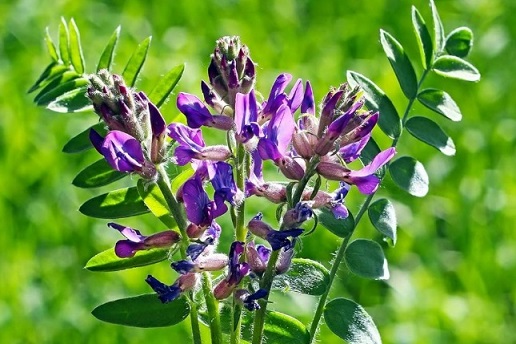Phytochemical from Root of Astragalus Plant Reduces Risk of Lung Damage Caused by Influenza Virus
Nikhil Prasad Fact checked by:Thailand Medical News Team May 01, 2025 9 months, 1 week, 6 days, 2 hours, 17 minutes ago
Medical News:
Ancient Plant Compound Found to Reduce Lung Damage from Influenza Virus by Targeting Immune Cells
Researchers from Linyi University and Shandong Agricultural University in China, along with the Carter Immunology Center at the University of Virginia in the United States, have made a major breakthrough in the fight against respiratory viral infections. They have discovered that a natural compound found in a traditional Chinese medicinal herb, known as Astragaloside IV, can significantly reduce lung damage caused by the influenza virus.
 Phytochemical from Root of Astragalus Plant Reduces Risk of Lung Damage Caused by Influenza Virus
Phytochemical from Root of Astragalus Plant Reduces Risk of Lung Damage Caused by Influenza Virus
Astragaloside IV, extracted from the root of Astragalus membranaceus, has long been known in traditional medicine for its immune-boosting properties. Now, new scientific evidence shows that this compound not only lowers harmful inflammation in the lungs but also helps the lungs heal faster after a viral attack. This
Medical News report reveals that the compound works by targeting a type of immune cell in the lungs known as alveolar macrophages—cells that are both defenders and potential troublemakers during infections. When overstimulated by viruses like influenza or even SARS-CoV-2, these cells can cause severe inflammation that worsens lung damage instead of protecting the body.
Protecting the Lungs by Calming Inflammation
The study involved laboratory experiments and tests on mice infected with influenza A virus (IAV). Mice treated with Astragaloside IV had better survival rates and showed less weight loss compared to untreated mice. Their lungs also showed fewer signs of inflammation and damage. Blood samples from the lungs revealed that key inflammatory chemicals like TNF-α, IL-1β, and IL-6 were drastically reduced in the treated group.
Interestingly, the treated mice did not have lower levels of the virus itself—meaning the compound didn’t kill the virus directly. Instead, it controlled the body’s overreaction to the infection. More importantly, it promoted the repair of lung tissues by boosting the activity of special lung cells called alveolar type II cells, which are responsible for healing damaged lung lining.
How the Compound Works on a Molecular Level
At the heart of the discovery is the Wnt/β-catenin signalling pathway, a cellular communication system that regulates how cells grow, repair, and respond to stress. This pathway, when overactivated in lung macrophages during viral infections, leads to high inflammation and worsened lung injury. The study found that Astragaloside IV can inhibit this pathway. It binds directly to a protein called β-catenin, reducing its activity and preventing it from switching on inflammation-related genes.
Lab tests confirmed that after treatment with Astragaloside IV, there was a clear drop in β-catenin activity and in the production of several inflammation-driving chemicals. Even when scientists tried to artificially
boost the Wnt/β-catenin pathway using a chemical activator, Astragaloside IV still managed to suppress the resulting inflammation.
Preserving Mitochondrial Health and Slowing Harmful Metabolism
Another key finding of the study was the effect of Astragaloside IV on cell metabolism. During severe infections, lung macrophages often switch to a state called “glycolysis,” where they burn glucose rapidly to produce energy in an emergency mode. While useful at first, this switch fuels an out-of-control inflammatory response.
Astragaloside IV was shown to reverse this harmful metabolic state. It helped restore normal mitochondrial function—the energy-producing parts of cells—and reduced glycolysis in macrophages. This was proven by measuring key metabolic signals such as oxygen consumption and mitochondrial health in both lab-grown cells and mice. The compound also increased the expression of several genes involved in healthy energy production, such as NDUFS6, COX5A, and ATP5MF.
Network Analysis Links the Compound to Viral Infections and Inflammatory Control
To better understand how Astragaloside IV interacts with human biology, the researchers conducted computer simulations and network analysis. They found that the compound shares multiple target genes with pathways involved in both influenza and COVID-19 infections. One of the top shared targets was CTNNB1—the gene that encodes β-catenin—confirming the compound’s role in regulating inflammation through this specific pathway.
Molecular docking simulations showed that Astragaloside IV fits snugly into the active pocket of β-catenin, further supporting the idea that it can directly block this protein’s harmful actions during infections.
A Promising Step Toward Safer Therapies for Viral Pneumonia
These findings offer a powerful new perspective on how natural plant compounds can be used to manage severe viral infections like influenza and potentially even COVID-19. By targeting the immune response rather than the virus itself, Astragaloside IV may help reduce the risk of life-threatening inflammation while promoting recovery of damaged lung tissues.
The study concludes that Astragaloside IV could serve as an effective and safe option for reducing respiratory complications in viral infections. It works not by killing the virus, but by calming the immune system, improving energy production in immune cells, and supporting lung healing. This discovery could lead to the development of new supportive treatments for patients with severe viral pneumonia, especially during times when antiviral drugs or vaccines are not fully effective.
The study findings were published in the peer reviewed journal: Veterinary Research.
https://link.springer.com/article/10.1186/s13567-025-01529-5
For the latest on Herbs and Phytochemicals, keep on logging to Thailand
Medical News.
Read Also:
https://www.thailandmedical.news/news/selenium-strengthens-immunity-and-helps-fight-viral-diseases-including-covid-19-and-influenza
https://www.thailandmedical.news/news/elderberry-extract-and-quinine-show-promising-antiviral-potential-against-influenza-and-covid-19
https://www.thailandmedical.news/news/new-approach-using-traditional-japanese-medicine-and-minocycline-for-influenza-treatment
https://www.thailandmedical.news/articles/influenza-or-flu
https://www.thailandmedical.news/pages/thailand_doctors_listings
